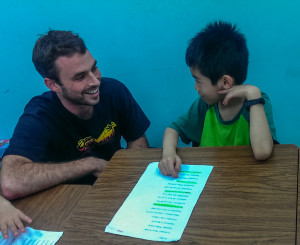8 Fun Activities for Teaching Verbs
Teaching verbs can be a pain in the butt for everyone.
Regular and irregular verbs, past tense, past participle and past conditional… It’s confusing even for native speakers. When it comes time to learn or review verb tenses, you’ll want to find as many ways as you can to make it fun and intuitive.
Here are eight great activities and games for teaching verbs to keep things fresh and actually make verb conjugations fun.
Storytime
Create a story that features the verb in many different conjugations. Ask the students repetitive questions that involve the verb, so that they hear it in context many times. This can be a great way to introduce a new verb and give the students a chance to hear its various conjugation in context.
Charades
Give students a time limit to act out a certain verb. To get more practice within context, tell the guessers they have to use the phrase “Are you (v)ing?” or “Do you (v).”
Relay Race
Write a list of pronouns on the board (I, you, he, they, she, it), and then have two teams line up at the board. When you give them a verb, the first team member writes the verb conjugation for the first pronoun, then hands the marker to the second team member to write the verb conjugation for the second pronoun, and so on until they have them all.
You can switch tenses to make it more challenging.
Mother May I
A great game for beginners who need lots of speaking practice with verbs. They stand in a line, and ask your permission to move forward by using the phrase “Mother may I (v).”
You can establish that a “Yes, you may” answer allows them one move (one hop, one jump, one skip, etc) forward, or for more advanced students, have them ask for the number of moves forward, as well (“Mother may I jump 3 times?” “Mother may I walk 3 big steps forward?”
Twenty Questions Teaching Verbs Edition
One student comes to the front of the class and is given a verb. Other students have to guess what the verb is by asking simple yes or no questions. For example: “Do you do it at home?” “Yes.” “Do you do it by yourself?” “No.” “Do you do it in your kitchen?” “Yes.” “Do you like to cook?” “No.” “Do you like to eat?” “Yes!”
For practice with past tense, change the phrase to “What did I do yesterday?” You can give them a limit on the number of questions they can ask, or allow them to ask until they guess it.
Verb Ball Toss
Students stand in a circle and pass the ball around. As they pass it, they describe their action: I (v) the ball. You can pause and ask – did (person) (v) the ball?
Tic Tac Toe
This one is a classic, fun game. Draw a tic tac toe board, and write a pronoun in each square. Play in teams. On a team’s turn, they send a member to the board. The team member is given a verb which they have to conjugate correctly using the pronoun in the square that they want to mark.
If they give the wrong answer, it is the other team’s turn. To make the game last longer, you could make it a game of connect 5 instead of tic tac toe. You can also give them a tense as well as the verb, for more advanced students.
Mad Libs
This is a classic, hilarious, and versatile game that can be adapted to any number of ESL situations. Create some mad libs that feature a lot of verbs, and make sure that as students are filling them out, they are paying attention to the context and tense of the sentence and conjugating the verb properly.
Remember, it takes a long time for verb conjugations to become intuitive. You’ll hear your students frequently getting them wrong in speech even though they just answered perfectly on a test – remember that even native speakers frequently mix up verb conjugations and tenses as kids.
Keep incorporating the verbs they have learned into lessons, give them a lot of opportunities to hear and read the proper tense, and it will eventually become second nature to them.
Still interested? Check out this post on pronunciation issues for ESL learners.
Do you have any games you want to add? Or can you build upon these 8 games in any way? We want to hear about it! Let us know in the comments section below.





